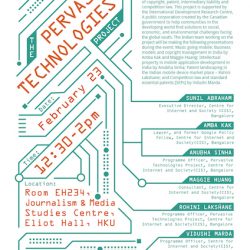AI in Asia: AI for Social Good
AGENDA 6TH MARCH 2017: PUBLIC CONFERENCE 9:15 am Registration commences Chair: Toshie Takahashi, Professor of Waseda University, Local Organiser 9:45 am Welcome remarks Malavika Jayaram, Executive Director, Digital Asia Hub Prof. Kazuaki Ueno, Director, Research Institute for Letters, Arts and Sciences, Waseda University 10:00 am Opening Keynote: Dr. Yutaka Matsuo, University of Tokyo 10:30[…]







